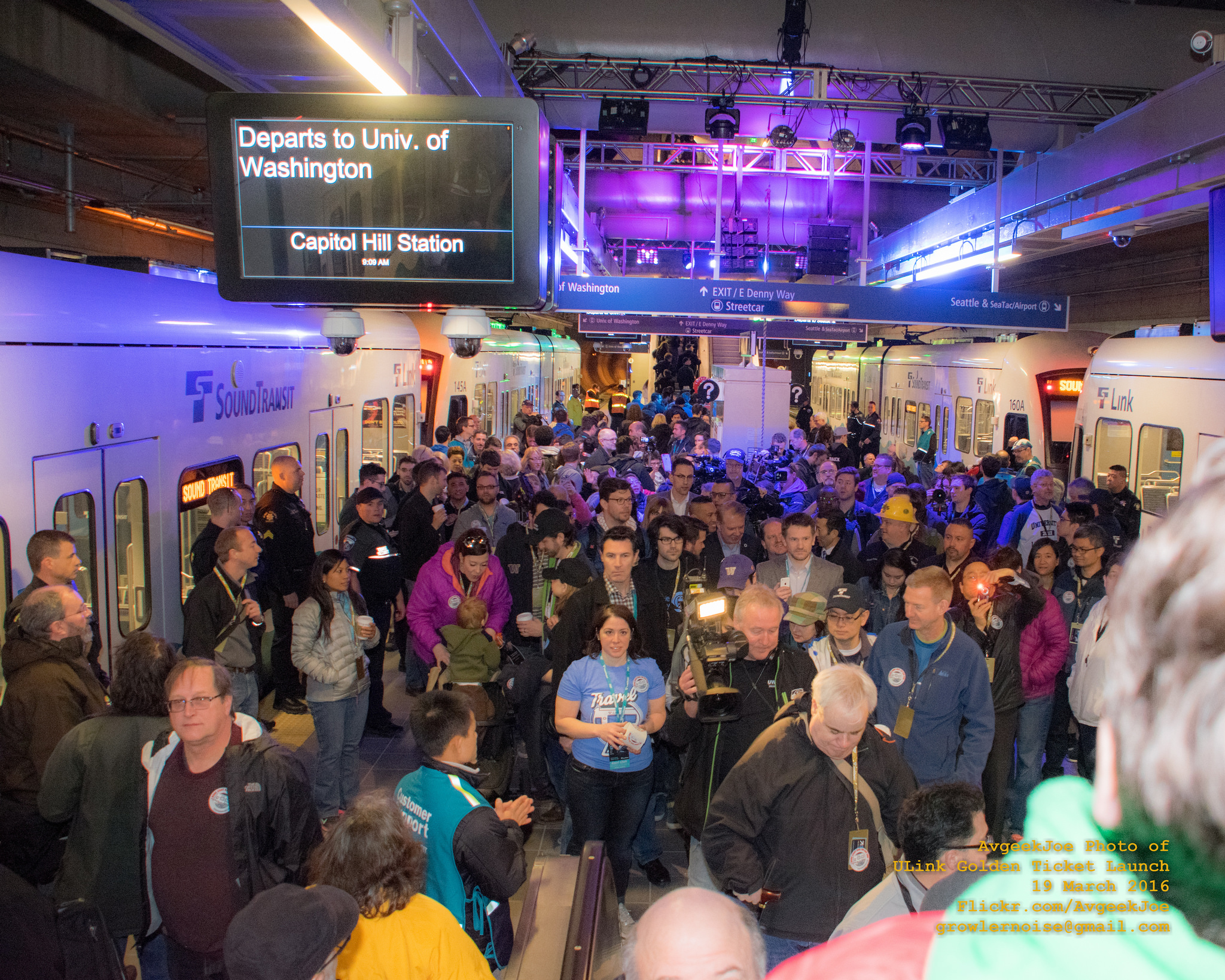
There’s a Seattle Times article claiming that Sound Transit spent $858k on a “party” for the opening of University Link. Don’t buy it.
Despite the headline, most of this money was not spent on frivolous things. If you look beyond the headline at what it was actually spent on, you see it’s mostly stuff that relates to promoting the function of transit. Furthermore, there is a strong case to be made that we need more promotion of transit, not less.
According to the article:
Most of the money went to planning or logistics: crowd management ($209,436); police overtime ($29,520); and event management ($260,200), which included planning over the course of a year. An additional $130,198 was spent for an ad campaign on radio, the Web, print, billboards, movie screens and gas pumps.
Crowd control and event management is pretty standard for huge events like this. This was a long-awaited mass transit system serving one of the densest neighborhoods on the entire West Coast. Not spending money on crowd control wouldn’t have been frugal, it would have been dangerous. After all, we’re talking about 30,000 people!
Transit and Advertising
The success or failure of mass transit depends upon people riding it. $130,000 for advertising might sound like a lot of money, but consider that with an already funded mass transit system, every additional rider has virtually no additional cost. A $2.50 monthly pass rider will spend up to the cost of a transit pass each month ($90). For $130,000 to pay for itself, it needs to sell the equivalent of 1,445 passes. The inauguration day celebration had an attendance of about 30,000 people and countless more saw the ads. Let’s assume that number was 100,000, though it may have been far higher. In order for the ads to pay for themselves, Sound Transit would need to have a success rate of just 1.44 %. This is why transit agencies such as Los Angeles Metro have recently paid more attention to ads: for a large established transit system, it’s often extremely cost efficient. Furthermore, how people commute when they’re young tends to influence how they commute for the rest of their lives. Capitol Hill and the University of Washington have a lot of young people.
Critics of the inauguration day celebration, such as Maggie Fimia of “Smarter Transit,” are quoted extensively in the article. Fimia promotes a kind of “if you build it, they will come” idea. If you believe that, then any money spent on promoting transit is always and automatically wasted, since people will make the same choices anyway. Yet this is not the world we live in: Car companies and airline companies and many others understand the importance of advertising both to spread knowledge about their products and influence attitudes. If Fimia knows much more than they, then she should quit politics and get rich by running companies that don’t promote their products.
I can’t speak for what “event management” means without seeing more information, but let’s consider the role of the entire event as advertisement. Professional advertisers have long known that slogans and imagery are a poor second to direct experience. The product needs to be good, but it helps if people can try it themselves. This is why grocery stores give out free samples. As it happens, University Link is a very, very good project. How then to encourage people to sample how awesome it is? First, create some buzz and excitement by advertising and calling your event a party. Second, ensure that people’s first experience is positive, with lots of stuff going on and a few handouts like bags, pins, and cardboard cutouts. In other words, exactly what Sound Transit did. And it worked: University Link is already breaking records for ridership in its first month of operation!
Nevertheless, Sound Transit needs to be prepared for more of this. To some degree it’s unavoidable. Haters gonna hate. But, there are some things that the agency can do to avoid giving their critics more ammunition. For one, they can get ahead of the story by making the case to the public that things like advertising transit is a good idea. They should cite case studies and research that guides their advertising choices. The video linked to earlier from Los Angeles Metro does a really good job explaining the connection between advertising and transit service.

Furthermore, Sound Transit and our other transit agencies can improve their advertising and defend against accusations of waste by making and adhering to a marketing plan that’s public and transparent. While we can’t always know the exact effect of advertising on new service that has no prior ridership level, the agency can at least collect data on attitudes and exposure to ads. We know, for example, that at least 30,000 people attended the opening day event. More information on what influenced them to attend and how they feel about transit would help Sound Transit improve its efforts to attract more riders while at the same time giving them more to push back against critics who take the short-sighted view that advertising transit is a waste.
It’s unfortunate that The Seattle Times should take such a reactionary view to promoting transit. American transit agencies have for decades been under pressure to cut costs while at the same time grow ridership. The only way to break out of this cycle is to improve service and let people know about it, thereby accelerating the virtuous cycle of higher ridership leading to better service. The exact role of advertising versus service improvement is worthy of debate, but it’s not clear whether the Times even wants Sound Transit to succeed. The Times has opposed every single Sound Transit Ballot measure and it’s not hard to believe that this article is the first shot in the war to kill the next one. In other words, all of this “concern” about efficiency amounts to little more than concern trolling. Don’t buy it.
The opinions expressed by Alex in this article are solely his own. The featured image at the top of the article is sourced from Flickr and credited to Joe A Kunzler.
Alex Broner is Director of Housing Now, a project of Welcoming Communities Washington.

